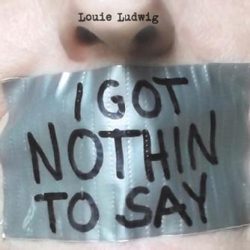
N ew Orleans singer-songwriter Louie Ludwig makes music that jumps off the page as he and his friends have put together an electric variety of sounds. Somewhat quirky, always original Ludwig and this fine set of Louisiana players serve up country, folk, blues, jazz with a hint of pop and 1970s American singer-songwriter. There are major contributions from Chris Waterman (bass), Clay Parker (acoustic, electric guitar, banjo), Danny Kane (steel guitar) and Eric Reed (drums) plus slots from Gina Forsyth (fiddle), Bart Ramsey (piano), Patrick Sylvest (mandolin), Mike Rosato (harmonica) and brass from Derek Huston (saxophone) and Craig Klein (trombone) and others. Ludwig’s music is about a sound, a thoughtful cool as they come groove; his lyrics are simple, his homespun philosophy of the kind the listener can quickly become lost absorbing the gorgeous hues.
ew Orleans singer-songwriter Louie Ludwig makes music that jumps off the page as he and his friends have put together an electric variety of sounds. Somewhat quirky, always original Ludwig and this fine set of Louisiana players serve up country, folk, blues, jazz with a hint of pop and 1970s American singer-songwriter. There are major contributions from Chris Waterman (bass), Clay Parker (acoustic, electric guitar, banjo), Danny Kane (steel guitar) and Eric Reed (drums) plus slots from Gina Forsyth (fiddle), Bart Ramsey (piano), Patrick Sylvest (mandolin), Mike Rosato (harmonica) and brass from Derek Huston (saxophone) and Craig Klein (trombone) and others. Ludwig’s music is about a sound, a thoughtful cool as they come groove; his lyrics are simple, his homespun philosophy of the kind the listener can quickly become lost absorbing the gorgeous hues.
All tracks are original other than traditional tune Old Virginia (given an obscure, solo fiddle warmed version) and three co-writes, The Day My Daddy Swam To Mexico (with Anders Osborne). Arguably the finest song on the album he is accompanied by unlisted harmony vocals and piano where you have a sound akin to the recently deceased, Greg Trouper. Here lies a hint of where you could best file Ludwig’s music. Fool For You likewise has some fine and unlisted piano, and knowing Ramsey’s track record this just has to be him cook up a storm with Huston here. Pure New Orleans blues come jazz. On occasions it reminds me of the music of The Band (Garth Hudson).
Title-track I Got Nothin To Say (In the Very Worst Way) in comparison leans more towards your classic pop singer-songwriters of the 1970s (Randy Newman maybe?). If I were asked what tracks are the finest creations, World Without War would figure highly, plus the finely penned, harmonica, banjo, steel guitar and bass propelled If You Ever Lose Jesus (man, the playing on this song is some of the best of its kind) and with a blues jazz feel Blame It On The Storm utilises a ton of nuances.
Louie Ludwig is one of those guys who at his best can guide the listener through different genres without either blinking an eye. Such the essence of his work as he skips over from If You Ever Lose Jesus to the heated God Hates Flags as all surplus energy is released to the mellow and quite timeless Blame It On. Such is the ambiance you could be in some smoky New Orleans barroom in the 1930s.
Summary
New Orleans multi-faceted singer-songwriter recording artist


